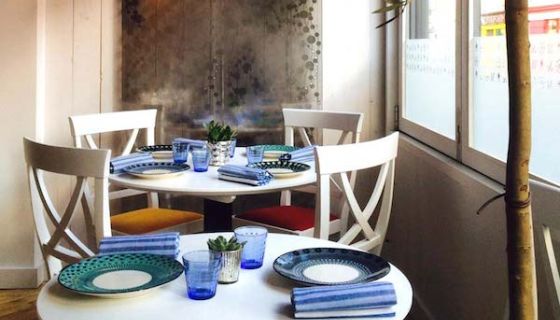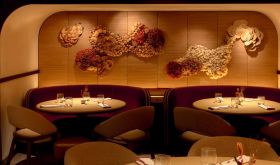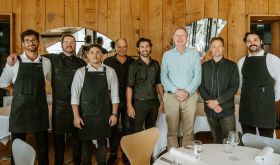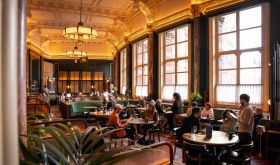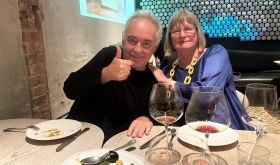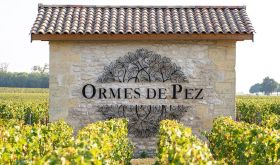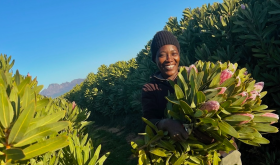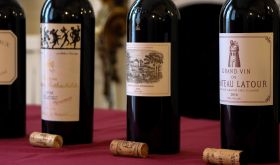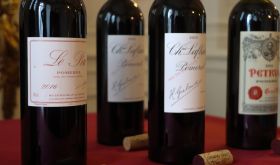Over the course of our evening at Wormwood in Notting Hill Gate, West London, a restaurant that draws its principal culinary inspiration from North Africa, the broad appeal of what lay on the restaurant’s shelves was matched by the dexterity evident in what emerged from the basement kitchen.
There was a mound of sweet seffa couscous surrounded by four large pieces of lobster tail around which was poured a thick lobster bisque, a combination I had never enjoyed before. A first course, entitled Dr Gherkin and Mr Cucumber, showed that the chef was equally dextrous with inexpensive ingredients. Half a gherkin had been charred as though it were a piece of meat and then served alongside tzatziki, sliced cucumber and yoghurt, both of which were enlivened by spicy Espelette pepper.
Four particularly authentic dark corn tacos were served alongside pulled pork with guacamole and a tamarind sauce that showed off an obvious Mexican bias while the presence of the ras-el-hanout spice mix alongside the slow-cooked pork belly took the culinary focus back to Morocco.
Morocco and Tunisia featured in several of the travel books on the bookshelf in front of me, next to cookbooks by leading French chefs such as Pierre Gagnaire and Alain Ducasse as well as a copy of Traditional British Cooking. Next to them were five different-coloured porcelain skulls each containing Los Ultimos Dias tequila that the bar uses to make the infusion for its obviously potent cocktails. By contrast, our engaging waitress Nicola hailed from Abergavenny in Wales.
The man responsible for bringing all this together, and for the menu’s successful execution, is chef/proprietor Rabah Ourrad, whose CV is as colourful as his cooking and whose culinary ambition is disarmingly modest. ‘One day I would like to be able to cook as well as my mother and two of my eight sisters’, is how he puts it.
That he has managed to get even close is surprising given that Ourrad’s original career was in music. At the age of 19 he was the leading rap artist in his native Algeria, responsible for major hip hop success with his band mbs (the microphone breaks the silence). Moving to Paris as a student, he took part-time jobs in kitchens and was encouraged to switch careers by his brother Mohamed, who has worked as executive chef for Mourad Mazouz’s Momo restaurant group.
Unsure which particular culinary path to follow, Ourrad tried several: a stint in Barcelona; a couple of years at Sketch in London, where he fell under the spell of French chef Pierre Gagnaire; and time in the otherwise predominantly Australian brigade of Brett Graham at The Ledbury just round the corner from Wormwood. Eventually Ourrad was encouraged to head off on his own with the backing of another brother, Akli, a successful engineer.
That Wormwood, which draws its name from the elixir Ourrad’s mother used to apply to alleviate the pains and discomforts of her children, has ended up in this colourful part of Notting Hill seems fitting. Here the W11 streets are much livelier than most, and several others have now followed Ourrad’s example of converting a once-forlorn restaurant – this outpost of North Africa used to be a Chinese restaurant – into somewhere more exciting. Just along the road, Wolfe has opened and incomers from Piacenza in Italy are soon to open another new restaurant.
Ourrad has infused his establishment with two distinct attractions. The first is physical in his successful creation of Moroccan style within a narrow European building. At the front are folding windows and an olive plant. Running along the ceiling throughout the main restaurant is a stencil of a camel bone and at the back is a conservatory inlaid with hand-made Moroccan tiles and in which a healthy virgin vine blossoms. It is a most attractive room to look at but is challenging acoustically.

The menu is intentionally also not quite what it seems. Ourrad’s ambition is to offer 18 different savoury dishes, six vegetarian, six meat and six fish that rotate quite regularly but only 17 appear in print on the menu. The missing dish is the special of the day that our waitress explained to us once we had sat down. ‘This gives us two advantages’, Ourrad explained. ‘The first is that it allows the waiting staff to initiate a conversation with our customers instead of merely placing the menus in front of them. The second is that as this special is a dish that is evolving, it allows us to evaluate reactions to it. If it does not prove popular then we know we have more work to do.’
Four of us ordered six savoury dishes, two desserts and two bottles of wine and our bill came to £197, extremely good value. And while the range of food reflects Ourrad’s unusual career path (his Mexican wife provides the South American input), it is the absence from the menu of any formal structure – it is not broken down into first or main courses – that some diners may find confusing but reflects the chef’s political upbringing in Algeria.
‘In my country there has been an absence of freedom for far too long and I don’t want that for my customers. I want them to be able to choose as freely as possible and then it is up to me, as a Mediterranean chef who uses olive oil rather than cream or butter, to make them happy.’
Wormwood 16 All Saints Road, London W11 1HH; tel +44 (0)20 7854 1808

